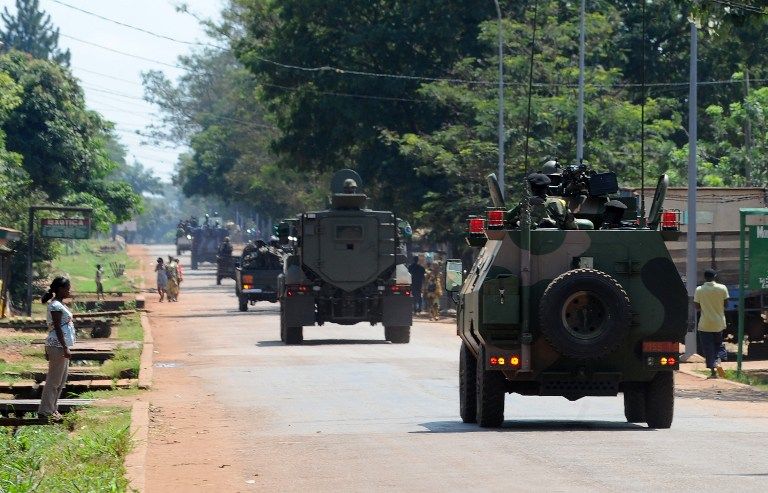SUMMARY
This is AI generated summarization, which may have errors. For context, always refer to the full article.

BANGUI, Central African Republic – France vowed Tuesday, December 10 to finish its job in the Central African Republic (CAR) after the death of two elite soldiers highlighted the risks of a mission to disarm rogue rebels who have plunged the country into chaos.
Antoine Le Quinio, 22, and Nicolas Vokaer, 23, both members of the crack 8th Parachute regiment based at Castres in southwestern France, died after being caught up in a fierce firefight during a night patrol in the capital Bangui, where bloody sectarian clashes left hundreds dead last week.
Defense Minister Jean-Yves Le Drian said the first French losses would have no impact on the tactics or the size of the 1,600-strong force Paris has deployed in its troubled former colony.
The troops are there to support an African contingent that is due to grow from 2,500 men. But so far it has been the French who have been at the sharp end of the operation.
“I think that with those numbers we will be able to restore peace and security across the country,” Le Drian said.
“There was an unusually violent confrontation. The two soldiers were brought back to the army hospital at the airport but they died of their injuries.
“There is no such thing as an easy military operation. There is always a lot of risk but it is vital that we disarm these militias.”
Violence resumes at lower level
French officials announced on Monday that Bangui had largely been cleared of marauding armed groups.
Lower-level violence resumed Tuesday however with Muslim-owned shops in the Combattants quarter of the town being looted. The owners were taken out of the area by African troops for their own safety.
AFP reporters witnessed at least two pick-ups full of armed men circulating in the town while French troops had set up a roadblock on the main road north from the capital to check everyone coming in and out for weapons.
President Francois Hollande, who is to stop in Bangui on his way back from Nelson Mandela’s memorial service in South Africa, paid tribute to the paratroopers who he said had “lost their lives to save many others.”
A year to the day after Seleka — a motley coalition of Muslim rebels and foreign warlords — took up arms, Hollande was to hold talks with their leader-turned-president, Michel Djotodia.
The French forces had deployed in the wake of days of horrendous violence in Bangui in which nearly 400 people were killed, most of them clubbed or hacked to death.
Humanitarian catastrophe
Djotodia’s Seleka captured Bangui and ousted president Francois Bozize in March. Djotodia became the first Muslim president but while some Seleka members remained loyal to him, others started terrorizing the population and government forces were powerless to stop them.
Months of massacres, rapes and looting followed, sparking a humanitarian catastrophe.
A third of the population needs food aid and the UN children’s agency UNICEF said nearly 480,000 people — mostly women and children — had been displaced since the March coup.
The UN High Commissioner for Refugees reported Tuesday that an estimated 108,000 people had been displaced in recent weeks in Bangui alone, many of them opting to sleep outdoors under pouring rain rather than risk spending the night in their homes.
In Geneva, International Committee of the Red Cross (ICRC) spokesman Jean-Yves Clemenzo told reporters that the organization was gravely concerned by the situation.
“There are only two hospitals operating and there are not enough medical staff,” he told reporters.
Hollande under fire at home
The military intervention has prompted some criticism from Hollande’s foes at a difficult time for the French economy.
Opposition center-right lawmaker Christian Jacob raised concerns over “the length of the intervention, France’s isolation and financing.”
Similar objections were made to France’s intervention in Mali earlier this year but polls suggested most voters backed that operation against armed Islamist groups, which has largely been deemed a success.
Seven French military personnel have died in Mali to date.
The government has played down the additional costs involved in the CAR deployment, which it hopes will be partly covered by funding from the European Union.
Foreign Minister Laurent Fabius said the net cost to French taxpayers would be minimal. “If we did not intervene quickly it would have cost much more,” he said.
Criticism that France is acting alone will be partly offset by the announcement, made overnight, that the US is to provide C-17 transport aircraft to fly African peacekeepers from Burundi into CAR.
Prime Minister Jean-Marc Ayrault told parliament Tuesday that the French commitment in CAR would be a matter of months, not years. – Rappler.com
Add a comment
How does this make you feel?
There are no comments yet. Add your comment to start the conversation.